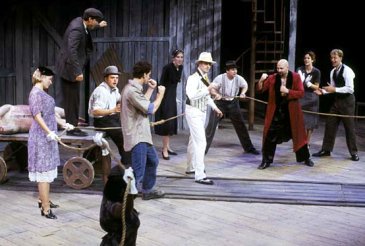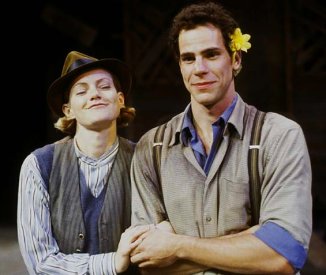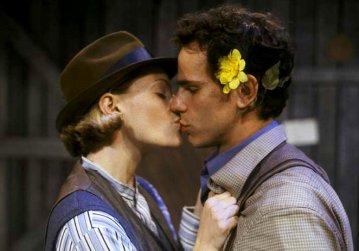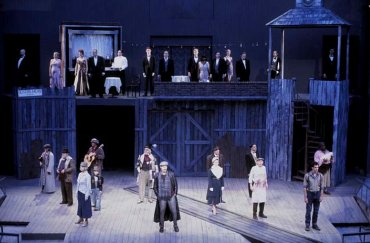Summary 
Imaginative modernization of the pastoral As You Like It to the stockyards and speakeasies of Prohibition-era Chicago. Colorfully drawn supporting characters - hobo Jaques, prize-fighter Charles, vaudeville magician Touchstone, drifter Amiens with acoustic guitar - enhance the romance set against the dichotomy of rich-and-poor, city-versus-country. An excellent production with clever concepts and astute direction.
Design
Directed by Eli Simon. Set by John Stark. Costumes by Lauren Lowell. Lights by Andrew Catron. Sound by Aaron Paolucci. Compositions by Alan Terricciano.
Cast
Frank Nall (Jaques), Christopher Cantelmi (Orlando), Henson Keys (Adam), Greg McGrath (Oliver), D.C. Wright (Charles), Corrie Danieley (Celia), Ailene King (Rosalind), Roderick Peeples (Touchstone), Nathan Hosner (Duke Frederick), Jack McLaughlin-Gray (Duke Senior), Tom Quinn (Amiens), Ryan Woodle (Silvius), Laura Ames (Phebe).
Analysis
Director Eli Simon cleverly modernizes the city versus country dichotomy of As You Like It, staging a 1930s Chicago speakeasy in the balcony of the Illinois Shakespeare Festival's outdoor theatre. The speakeasy is elevated both literally and figuratively from the stockyards and train tracks onstage. A bar filled with liquor bottles stands stage right with a bistro table and chairs, fronted by a face-brick railing. A spiral staircase, topped by a back-lit clock and a weathervane, leads down to the wood-planked stage, where train tracks cut diagonally from a ramp through the audience. A placard over an alcove at stage right reads "Oliver's Meats."
Simon's production begins with two blows of a steam engine whistle and the razzle dazzle of 1930s ragtime music. Jaques, a weary hobo in a long leather coat, boots and hat, delivers the 2.7 Seven Ages of Man speech as a soliloquy, with a mother and infant emerging behind him, then a schoolboy followed by a pair of lovers, and finally the full cast. In the balcony speakeasy, women in flapper gowns drink champagne and flirt with men in tuxedoes, while in the stockyard onstage, the Woody Guthrie-like drifter Amiens strums a guitar as the elderly Adam - in "second childishness" - emerges wearing a bloodied butcher's apron.

Oliver works the balcony bar in his tuxedo with vest and watch fob, wearing black-and-white wing-tipped shoes, and he lights a cigarette before descending to the stockyards. Onstage, Orlando muscles a cart full of slaughtered carcasses up the tracks. Wearing jeans with suspenders, boots and a work shirt, Orlando hauls the carcasses to meat hooks in an alcove while a brawl breaks out above him in the bar among the drinking, smoking, and dancing. Oliver, sipping from a champagne flute, begins to quarrel, but Orlando reveals his wrestling prowess by arm-locking and throttling him.
Simon delineates the differences between urbanity and rural culture, juxtaposing Orlando and Adam's friendship with the seediness of the speakeasy. The balcony teems with tough Chicago accents, one man passed out face down on the table, and an unconscious flapper is held aloft by her dancing partner. Charles, the Duke's "prizefighter," serves as the speakeasy's bouncer - bald, goateed and menacing - and he inadvertently crushes a cigar when he punches the palm of his hand.
From the balcony, Duke Frederick, a gangster in overcoat and white fedora, presides over the 1.2 fight. Simon modernizes the wrestling match to a bare-knuckles fistfight, with Charles in scarlet robe and black silk pants warming up like a boxing champion, punching the air and bobbing and weaving. Spectators use rope to create a ring, but the fight becomes a free-for-all as Charles smashes Orlando with a hog carcass, then knocks over a woman. A loyal-to-the-Duke spectator swings a two-by-four at Orlando, but Orlando ducks, and the board breaks across Charles' face. Charles spins, spits out some teeth, and collapses to the stage. The Duke stops the mayhem with a single pistol shot, and Charles is carried out like a carcass on the cart. The shirtless Orlando picks up teeth as souvenirs, flirts with the rapt Celia, then bows as Rosalind puts a chain around his neck and slaps his chest. Once alone, Christopher Cantelmi's Orlando snaps his fingers and dances a jitterbug in his character's signature move.
Ailene King anchors the production with a smart, sassy, sophisticated Rosalind. For 1.3, a bed slides from beneath the balcony for a pillow fight between her and Celia, both attired in silk nighties. They pretend to fistfight like the adored Orlando, and after the Duke banishes Rosalind, Celia reveals Adam-like loyalty by insisting on a shared banishment that Rosalind enhances with "vaudevillian attire." Their friendship is ridiculed by the Duke's goons, who have a pillow fight of their own before seizing a maid for the Duke to interrogate. A vicious slap across the maid's face darkens the scene, which segues to 2.3, with Orlando and Adam kneeling in a spotlight.
Simon depicts Duke Senior's band as unemployed drifters on the outskirts of depression-era Chicago, an appealing concept that works well, especially outdoors. Snow-like confetti drifts in the breeze around the men in hats, scarves, and fingerless gloves, huddled around the orange glow of a trashcan fire. A fence stage right and a tree stump stage left are surrounded with drifts of "snow," and a set piece representing the back of a rail car slides into the alcove. The rail car, windows shuttered and chains dangling, is topped with the bar from the speakeasy, the bar ingeniously lowered to become the hatched roof. Amiens and a fiddle-player drift through the camp, supplying a folk-music score and song fragments. An offstage train whistle and howling wind are heard as one man "fishes" in a stage trap with twine hanging from a tree branch.
More drifters arrive - Touchstone, his motley coat a rag-tag array of sewn patches of cloth, then Silvius, who runs into a wooden wall stage left - and after Jaques' baleful song, Orlando arrives 2.7 brandishing a switchblade, desperate to save Adam. The men sing - "most friendship is fading" - and take tender care of the old man, one covering him with a blanket, while another offers a jug of liquor and another a cup of food. When Jaques again begins his Seven Ages of Man speech, he is beset upon and silenced - an inspired moment, with the passage already delivered to start the production - his fellow hobos apparently having heard the speech many times before.
3.1 begins with Oliver bound by ropes in the balcony, beaten in interrogation by Duke Frederick and his hit men, but the mood lightens as Orlando races about the stage in 3.2, tacking his love poems to weathered boards. A cock crows, and the bespectacled Touchstone - played much like W.C. Fields - speaks with Corin, who puffs a corn cob pipe. Touchstone wipes dung from his shoe and performs a magic trick, making one of Orlando's poems disappear from his clenched hand.

The attraction between Rosalind and Orlando - crucial to the play - is enhanced by the chemistry between King and Cantelmi. King's Rosalind wears suit and hat and speaks with intelligence and confidence, barely disguising herself and not masking her voice at all. Resolute with Celia - "I am a woman; when I think, I must speak" - she shows appealing 3.2 weakness with Orlando. When she kneels and untucks his shirt to help him be more careless in love, she becomes speechless and distracted at the sight of his belly. Simon brings intermission with a poetic moment as the characters exit: a spotlight shines on a single yellow flower of friendship emerging from the train tracks.
Peripheral characters prove less successful than the principals, but are colorful and briefly played: Oliver Martext a drunken minister, belching cigarette smoke and showing missing teeth as he dances; Audrey an itch-ravaged country girl, scratching at her legs and buttocks; and William a village idiot, always smiling and scurrying offstage. During 3.5, Phebe hurls a bouquet of flowers at Silvius, then pops them out of his hand when he gathers them, and finally she flings them offstage after he again gathers and offers them. The undaunted Silvius, an audience favorite, plucks the yellow flower from the train tracks and pursues her offstage.

King's Rosalind, despite her confidence, seems always on the verge of being discovered. In 3.5, she must turn the kneeling Phebe's face from her crotch, and in 4.1 Jaques gives her a double take after their parting embrace. After using the train tracks as a mock wedding aisle with Orlando, she trades playful slaps and wrestling moves with him, and he kisses her, long and lovingly. When Orlando comes to the awkward realization that he has kissed the "male" Ganymede and not Rosalind, he simply turns to Celia in confusion and only mutters, "So..." And in 4.3 Oliver discovers Rosalind's secret when he puts a hand to her "heart," and he refers to her with a laugh in 5.1 as "fair sista."
The 4.2 deer hunting is celebrated with a football game among the hobos, one player wearing antlers. They chant a hunting song, accompanied by Amiens' guitar and a makeshift bass played with a line stretched across a metal washing tub. Simons imbues scenes with similar flair: Phebe falls spread-eagled in 3.5 and is hoisted upright with a pull from two fingers by Touchstone; the reconciled brothers play catch with a baseball and mitts during 5.2; Rosalind manfully punches Orlando, but inadvertently thumps his slinged arm; and when Orlando, Phebe, and Silvius comply with Rosalind's instructions, they rush offstage but meekly return to exit in the correct direction. Most notable is the physical comedy of love-struck Silvius. He slams into another wall face first in 4.3, and when he is propelled into a doorjamb by Phebe in 5.2, he can only groan to acknowledge his instructions. Moments later, he trips and falls into a face-down sprawl on a stage left ramp, but promises to comply, "if I live."
Rosalind orchestrates the impossible 5.4 conclusion through hypnosis, dangling her watch before the Duke, Orlando, Phebe, and Silvius, who flops to the ground and sucks his thumb like a child. After Touchstone removes a flower for Audrey and a cigar for the Duke from the depths of his top hat, Celia and Rosalind enter in beautiful wedding gowns, flowers in their hair. Hymen appears and sings from the balcony as the to-be-wedded couples sing harmony back-up, then break into a hand-clapping sing-along song. Phebe gives a carnal growl, leaps into Silvius' arms, and they collapse in a lusty heap.

After Jaques and Touchstone trade coats - long leather for motley rags - and Jaques pushes himself down the tracks in a cart to join the reformed Duke Frederick in holy retreat, Adam and the goddess Hymen toss confetti from the balcony upon the couples. The pairs break into a lively square dance, and in another directorial flourish, they lapse into a 1930s-style slow dance, wedding rural spirit with urban sophistication.
The production concludes on a tender moment, with Orlando taking a downstage center spotlight for the epilogue. He steps aside, affectionately kisses Rosalind's hand, and gives way as King, glass of wine in hand, makes curtsy and ends Simon's astutely directed and expertly conceived production of a difficult play.
Note: A version of this article was edited and published in Shakespeare Bulletin, Vol.21, No.3, Fall 2003.